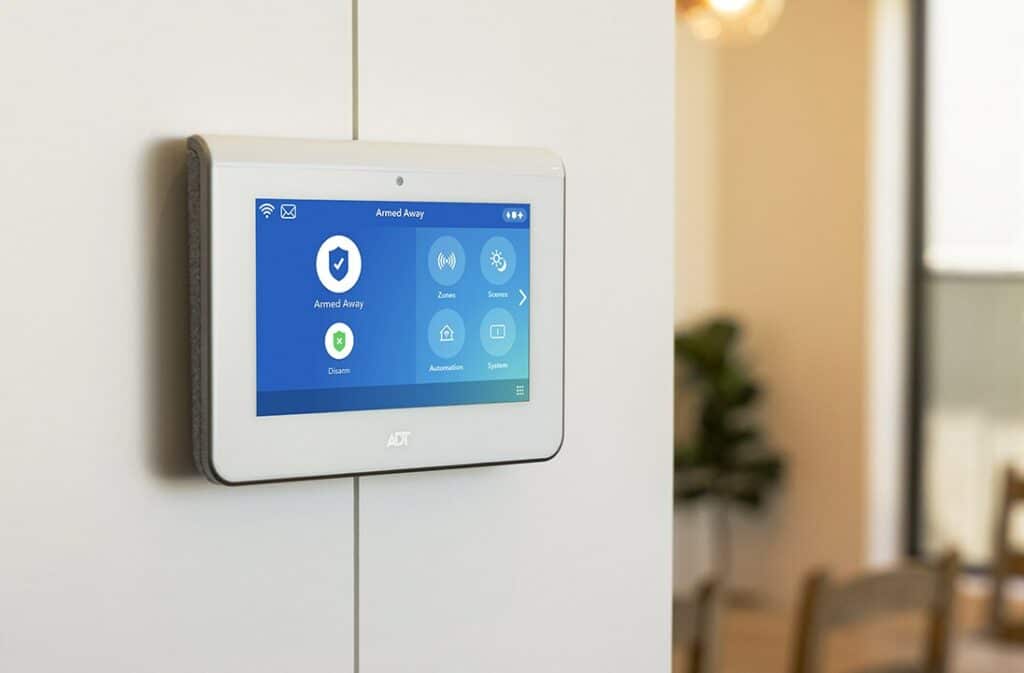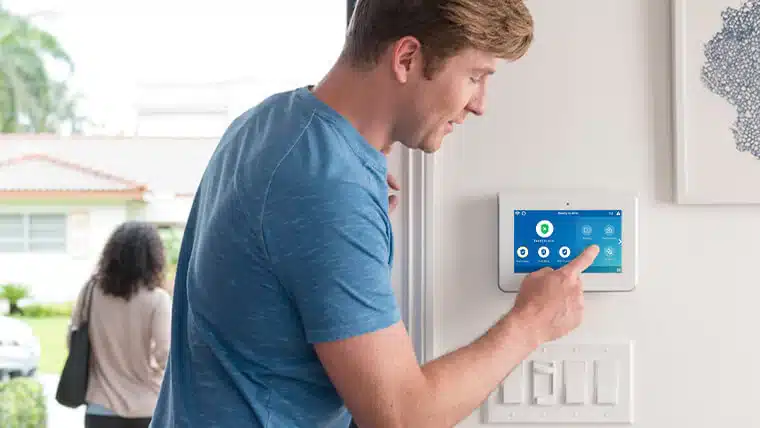An ADT alarm system is a reliable way to monitor the house for any intruders, whether you are home or not. If it detects danger, the system activates its alarm and alerts the customer monitoring centers to take appropriate action.
But sometimes, the ADT alarm might get triggered for no apparent reason. If that’s a recurring issue in your home, we know how frightening and stressful it can be.
If this happens to you often and you’re wondering what to do, you’ve come to the right place for help. Let’s learn how you can stop these false alerts.

Reasons for False ADT Alarms
1. Low Batteries
ADT security systems may sound false alarms if the battery level gets critically low. So if you hear a beeping noise, keep an eye on the battery level of your ADT system. If it shows “low battery,” your ADT alarm system’s batteries need to be changed.
2. Disrupted or Unstable Electrical Current
A disrupted flow of the electrical current or an unstable power supply can easily set off your alarm. Unfortunately, this issue is common in residences with outdated wiring systems. If resetting your ADT pulse getaway system doesn’t cut it, it’s best to get an expert to examine the system even when there are no apparent signs of wire damage.
3. Returning Home Without Turning off the Alarm
If you don’t insert the passcode after entering your home or insert it incorrectly, you will activate your ADT system.
The time offered by your ADT system to enter your passcode is known as “Time Delay.” ADT has two time delays: an exit and an entry delay.
The exit delay gives you 30 seconds to 3 minutes to exit your home without sounding an alarm.
The entry delay activates when you reenter, giving you a window of 30 seconds to 3 minutes to disarm the system. During the entry delay, the keypad gently beeps to remind you to disable the security system. If you don’t, there will be an alert.
Everyone in the household must understand how to input the code so the alarm doesn’t accidentally go off. However, for security purposes, only you and your immediate family should be aware of this code, and it should become second nature to each of you to arm and disarm the alarm system whenever you enter or exit the house.
Other Possible Reasons for False ADT Alarms
There are a variety of additional factors that can activate each type of ADT alarm. In the sections below, we’ll look at all the other reasons why a particular alarm sensor could sound apart from actual danger and intruders.
Common Reasons for False Door and Window Alarms
- Improperly closed windows and doors. If you don’t seal your windows or doors properly, they may eventually open.
- Misalignment between the contact and the magnet. The contact and the magnet might get misaligned due to renovation or other modifications in the home.
- Missing parts. If the contact or the magnet separates or slips off, the alarm will activate.
The total distance between the contact and the magnet cannot exceed ¼”. Otherwise, false alarms may occur. In the linked article, you’ll find all the information regarding ADT door and window sensors.
Common Reasons for False Motion Detector Alarms
- Motion from party decorations like balloons
- Pets running around
- Curtains fluttering;
- A movement from the ceiling fan
- Insects crawling on the motion detector
ADT advises periodically testing your motion sensors to ensure you have the best possible monitoring and detection systems. But if you want to learn more about the nature of your motion detector, check out their article on ADT Motion Detector Troubleshooting.
Common Reasons for False Glassbreak Alarms
- Fireworks;
- Loud music
- Loud TV
- The sensor is near a dog barking
On the one hand, when the detector senses a low-frequency sound, it thinks someone is banging on the glass, trying to break in. On the other hand, when the detector senses a high-frequency sound, it assumes that the glass is already being broken and raises an alert. Here’s more about the nature of ADT’s Glassbreak detectors.
Common Reasons for False Smoke and Heat Alarms
- Smoke from tobacco or fireplace, incest sticks, body sprays, and deodorants;
- Raised moisture levels from humidifiers, steamy bathrooms, or cooking in the kitchen;
- Dirty smoke detector;
- Insects in the detector.
ADT offers different heat and smoke detectors.
Each has its own weaknesses, so it might be good to check them all out to better understand your false alarm problem!
Tips & Tricks for Preventing False ADT Alarms
The most aggravating thing is when a security alarm suddenly goes off. You could ignore it if it only happened once or twice, but if it keeps happening, you must take action to solve the problem. After all, nobody wants a completely unreliable alarm.

Here are some of the best things you can do for your peace of mind:
- Inform anybody who might end up alone in your house — babysitters, family members, grown children — on how to avoid setting off the alarm and what they should do if that happens;
- Know the warning signals for low battery. The touchpad often shows BAT, LOW BATT, or SYSTEM LO BAT whenever the battery is low. However, the low battery may either come from the system’s backup battery or one of the sensors (door, smoke, or glass break sensor). For sensors, the signal will also showcase a zone number. If you don’t see a zone number, then the system’s battery is low;
- Regularly check the alignment of the door, window, and garage sensors. Typically, these contact sensors are magnetic and come in two pieces that separate when you open the door or window. If the door isn’t completely shut, they are improperly aligned, or one piece falls off, this will undoubtedly set off the alert;
- Pet owners should either relocate motion and glass break alarms or keep pets away from locations where they might unintentionally trigger the sensors and provoke a false alarm;
- Installing home equipment in an area where the detector could go off is not advised. For example, placing a speaker near a glass break detector will trigger the alarm into thinking that someone either hit or has broken the glass and tried to break in;
- You should regularly clean smoke detectors to eliminate dust and other debris. You can do that with a vacuum cleaner or a keyboard cleaner with compressed air. Maintain your smoke detectors at least once a month;
- Smoke detectors can’t differentiate between smoke and steam. As a result, ADT smoke detectors may be triggered when cooking in the kitchen and boiling or roasting something that produces a lot of steam and smoke. Additionally, humidifiers raise the moisture level in your house and produce steam, so there’s a high chance they will trigger a false alarm. The same goes for steamy bathrooms. Consider where you install your ADT smoke alarms to prevent such false occasions;
Conclusion
An alarm system can provide an added layer of protection for you and your family whenever you’re home or away. But frequent false alarms can make you view your security system as unreliable, which beats its purpose.
This issue is a significant problem you must address for everyone’s peace of mind.
All in all, finding the cause of a false alarm system is a process of trial and error, so you should investigate before taking action!
Sometimes the problem is simply a dusty alarm. Maybe you have a curious pet that may accidentally trigger a sensor whenever it gets too close to it. The alarm might be negatively impacted by the weather as well. Or your sensors could get misaligned.
Regular testing can help you identify and prevent possible system problems. If it doesn’t help, it’s best to contact ADT at 1-800-ADT-ASAP (1-800-238-2727) for further guidance. Keep in mind that false alarms need to be handled as quickly as possible so your security system can protect you and your family.